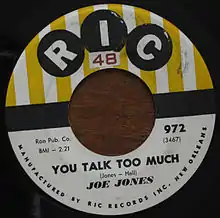Ric Records, along with sister label Ron Records, were American record labels formed by Joe Ruffino in 1959.[1] Although most of Ric's releases did not rise above regional hits, the label was active during the golden era of New Orleans R&B and was an incubator for many artists who are now recognized as definers of the style.

After his first taste of the music industry at A-1 Distributors,[2] Joe Ruffino set out on his own with the Ric and Ron imprints, headquartered at 630 Baronne Street in New Orleans.[1] The labels were named after Joe's two sons.[1] Ric Records was focused exclusively on releasing local New Orleans talent. Edgar Blanchard was brought in to help with studio arrangements, and supervised all early Ric studio sessions.[1] He was later replaced by Harold Battiste.[1] Mac Rebennack (later "Dr. John") was also brought on as label president and helped with writing and producing.[3]
Artists on the label included Eddie Bo, Johnny Adams,[4] Lenny Capello, Al Johnson, Tommy Ridgley and Joe Jones. Jones provided Ric with its only sizeable hit, "You Talk Too Much", which peaked at #3 on the Billboard Hot 100 in the fall of 1960.[1] This record was the cause of legal issues with New York City-based outfit Roulette Records, for which Joe Jones previously recorded a version of the tune.[5][6]
Sister label Ron Records had a similar focus on local talent. Artists released include Professor Longhair (local favorite "Go to the Mardi Gras"[7]), Irma Thomas, Bobby Mitchell, Eddie Lang (not to be confused with the jazz guitarist Eddie Lang) and Martha Carter. After being discovered in a local club by Tommy Ridgley, Irma Thomas recorded her first single "(You Can Have My Husband but) Don't Mess with My Man" for Ron within a week.[1] She is now recognized as an important American singer,[8] and was inducted into the Louisiana Music Hall of Fame in 2007.[9]
The Ric and Ron labels became dormant in 1962 when Joe Ruffino died.[1] Ruffino's brother in law Joe Assunt0, owner of the One Stop Records store procured the Ric and Ron tapes and reissued various popular titles for the next decade, adding a couple of Johnny Adams 45s to the label listings.[10] On Assunto's death in August 1981 the tapes passed to his daughter Joel Ann Mcgregor.[10]
References
- 1 2 3 4 5 6 7 8 Broven, John (1978). Rhythm and blues in New Orleans. Gretna, LA: Pelican Publishing Company, Inc. pp. 170–77. ISBN 0-88289-433-1.
- ↑ Slaven, Neil. "The Instant & Minit Story". Archived from the original on August 20, 2011. Retrieved February 20, 2011.
- ↑ Rebennack, Mac; Jack Rummel (1994). Under a hoodoo moon: the life of Dr. John the Night Tripper. New York, NY: St. Martin's Press. pp. 81. ISBN 0-312-13197-6.
- ↑ Dahl, Bill. "Johnny Adams Biography". Allmusic. Retrieved February 20, 2011.
- ↑ "Roulette Buys Jones Master From Ric" (PDF). Billboard: 4, 33. October 10, 1960.
- ↑ Ankeny, Jason. "Joe Jones Biography". Allmusic. Retrieved February 20, 2011.
- ↑ Nadal, James. "Professor Longhair Biography". Retrieved February 20, 2011.
- ↑ Block, Melissa (August 23, 2010). "Irma Thomas: The Soul Queen Of New Orleans". NPR. Retrieved February 20, 2011.
- ↑ Aswell, Tom. "Irma Thomas page at Louisiana Music Hall of Fame". Retrieved February 20, 2011.
- 1 2 Kelly, Red. "The Ric and Ron Labels". The Cosimo Code. Soul Detective. Retrieved 15 February 2023.